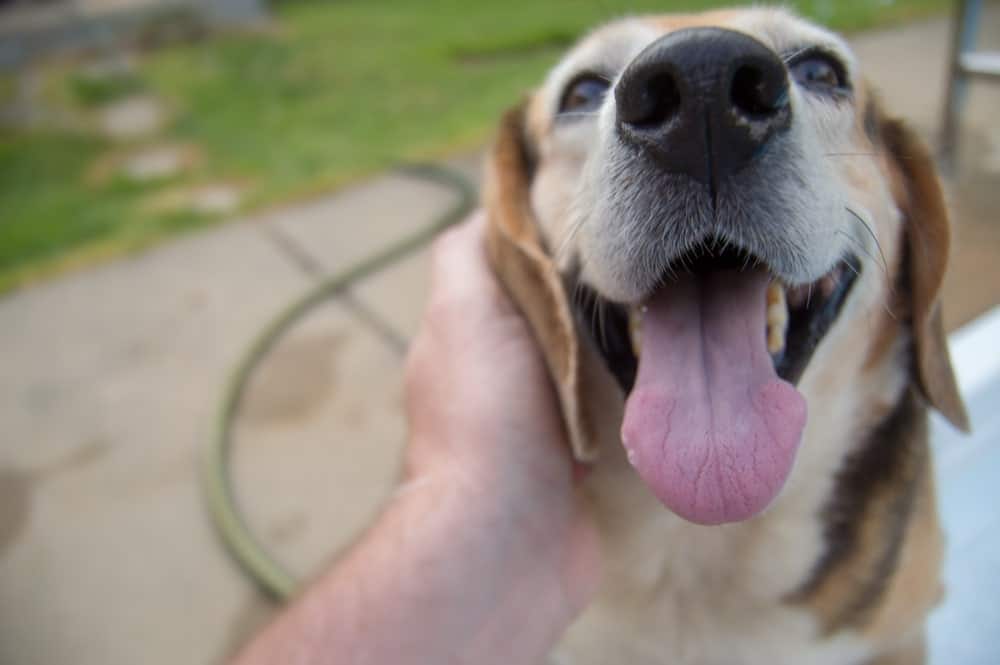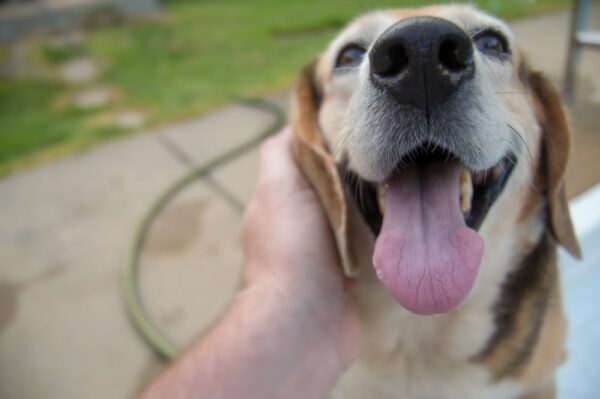Dogs generally don’t have pleasant-smelling breaths, but it should not be noticeably foul. It’s normal to smell your dog’s breath when they are close to your face or licking you. However, if they are panting and stinking up the room with their foul breath, then something isn’t right. A healthy dog’s mouth should have a mild smell similar to their food.
If your dog’s breath has a strong fishy, rotten meat, musty, or other overpowering smell, here are eight possible reasons why.
The 8 Reasons Why Your Dog’s Breath Stinks
1. Periodontal Disease
Periodontal and gum disease are common oral diseases that affect about 80% of dogs over 3 years old. Periodontal disease refers to an infection around the periodontal ligament that surrounds the root of the tooth, anchoring it in its socket. They are caused by a build-up of tartar that forms on a dog’s teeth when calcium salts in the saliva are deposited onto plaque bacteria. There are many signs of periodontal disease in dogs and bad breath is a major sign. Their breath may have an overpowering rotten smell that worsens depending on the severity of their oral health.
- Inflamed gums
- Loose or missing teeth
- Bleeding gums
- Thick layer of tartar on the teeth
- Exposed tooth roots
- Halitosis (bad breath)
- Appetite changes
- Difficulty chewing
- Pawing at the mouth
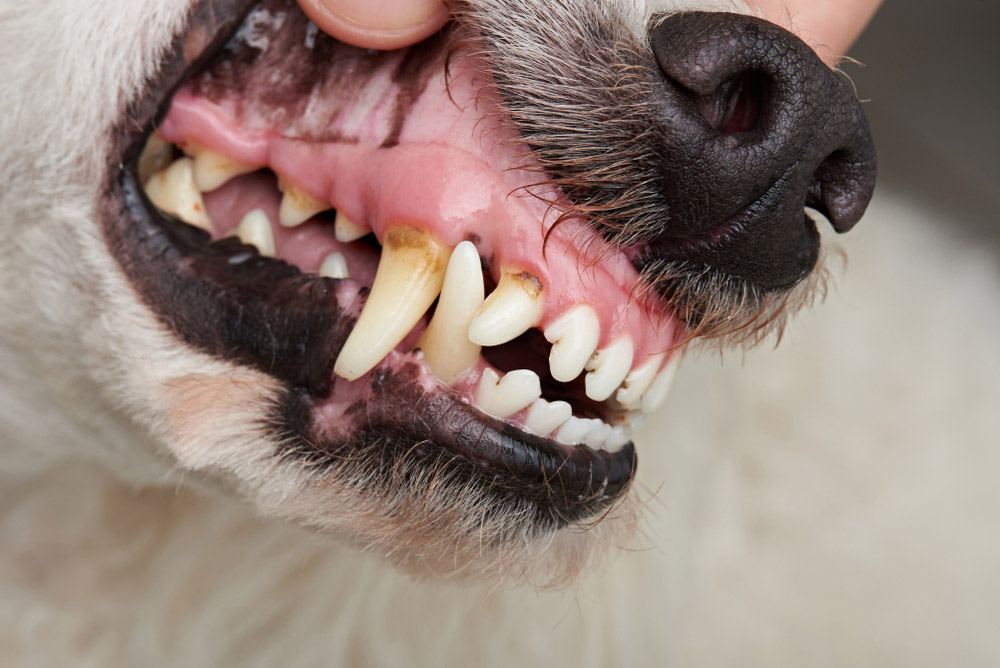
2. Gingivitis
Gingivitis refers to gum inflammation and is an early stage of periodontal disease. It is the only reversible stage of periodontal disease and can be treated with professional teeth cleanings and by regularly maintaining a dog’s oral health. Bad breath and inflamed, bleeding gums are signs a dog could have gingivitis.
If left untreated, gingivitis can develop into an advanced stage of periodontal disease that can cause tooth loss.
3. Digestive Issues
Your dog’s digestive health can affect how good or bad their breath smells. If your dog’s oral health is good, their bad breath could be caused by something internal, like digestive issues. These digestive issues can range from gastroenteritis, acid reflux, food intolerances, gastrointestinal cancer, and intestinal blockages.
Many digestive issues cause dogs to vomit, which can cause their breath to have a potent sour smell. This sour smell is caused by the bile and can even be smelt from dogs with acid reflux issues, even if they haven’t been vomiting.
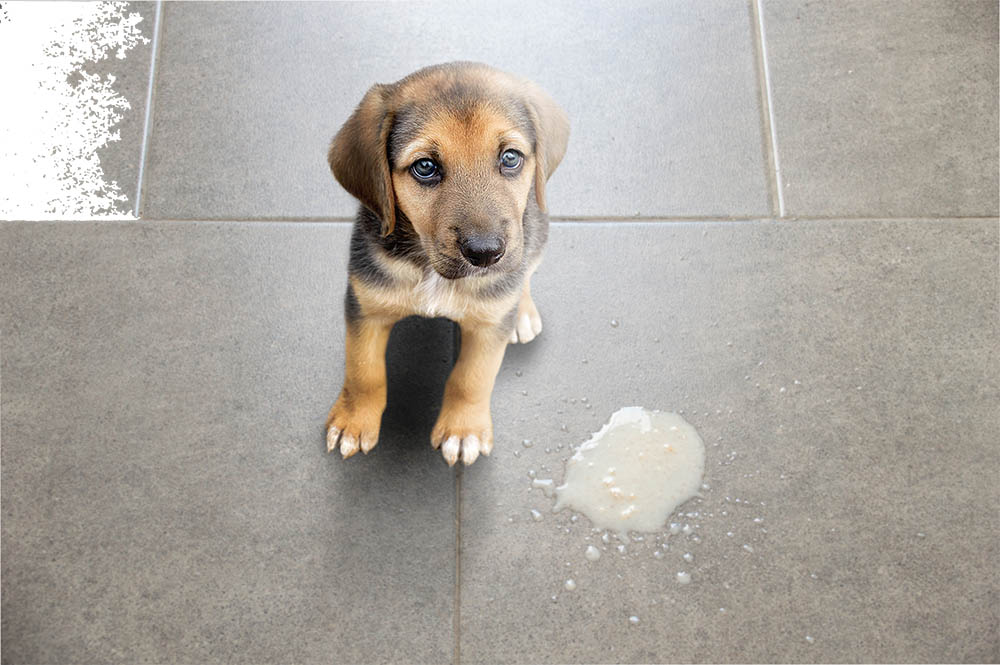
4. Dietary Habits
Your dog’s diet can have a heavy influence on how their breath smells. Although it is normal for dogs to have a mild-smelling breath that reflects the last thing they ate, certain things they try to eat or lick can cause foul breath.
Dogs that are eating diets containing seafood or fish oil supplements could have fishy breath shortly after eating.
Dogs that eat poop, whether it is their own or straight from a cat’s litterbox, could have a foul-smelling breath too. This is known as coprophagia and although we may find it gross, it is common for dogs to do. However, it does not have a good effect on your dog’s breath, and you probably won’t look forward to their kisses afterward.
5. Oral Cavity Disease
Aside from the teeth, the oral cavity includes the bones of the jaws, the tongue, the soft palate, the gums, and the inner lining of the cheeks. Injuries inside the mouth are fairly common and can lead to infection and necrosis of soft tissues, which give your dog bad breath. Unfortunately tumors can arise from any of these tissues which also lead to necrosis and bad breath.
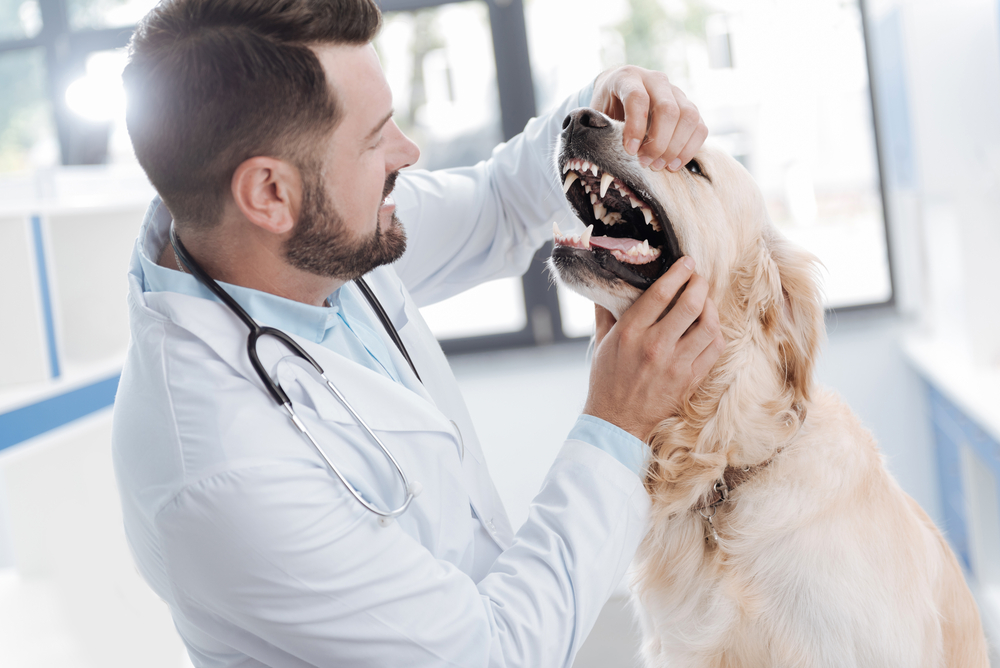
6. Canine Diabetes
Diabetic dogs can have bad breath because of ketoacidosis. Ketoacidosis is a life-threatening complication of diabetes in dogs and occurs when the body doesn’t produce enough insulin, and the body is forced to burn fat. Fat burning produces ketones which are toxic when they accumulate in the blood. Diabetic dogs in ketoacidosis have a sweet, fruity-smelling breath or a breath that smells like acetone. Interestingly, only certain people have the ability to smell ketones, possibly due to genetics.
7. Kidney Disease
Dogs with kidney disease or failure could have an ammonia-smelling breath caused by excess urea in the body. The kidneys are responsible for filtering waste products from the bloodstream and converting them to urine to be removed from the body.
In dogs with impaired kidney function, these waste products (urea) build up and cannot be effectively removed from the body through urine. Instead, the excess urea gets converted to ammonia when it reacts with saliva and is exhaled with each breath. This is what gives dogs with kidney disease a breath with an ammonia odor.

8. Anal Glands
Dogs with anal gland problems, such as an impaction or infection, are known to excessively lick and bite at the area. Their anal glands contain a gland fluid that is involuntarily expressed when a dog poops. When dogs have issues with their anal glands, they can become painful, and dogs may try to find relief by licking at them.
However, anal gland fluid has a potent fishy smell that can make a dog’s breath smell foul after licking.
Conclusion
There are several possible reasons behind your dog’s bad breath, such as dental issues, certain diseases, and dietary habits. It’s normal for dogs to have a mild odor from their breath but usually isn’t very unpleasant to smell. If you want to get your dog’s breath smelling fresh again, it’s important to find the underlying cause of their bad breath.
You should also maintain your dog’s oral hygiene with regular brushing and having their teeth professionally cleaned.
Featured Image Credit: Neal Bryant, Shutterstock

